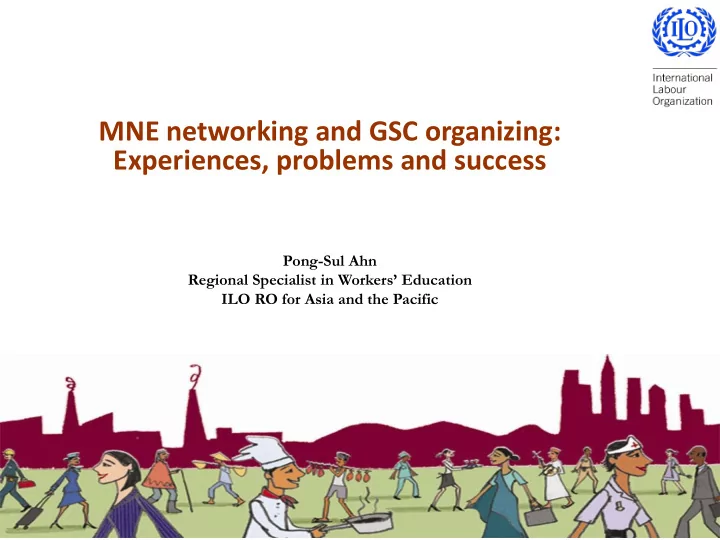

MNE networking and GSC organizing: Experiences, problems and success Pong-Sul Ahn Regional Specialist in Workers’ Education ILO RO for Asia and the Pacific
Contents of presentation 1. Global Framework Agreement and organizing trade union at Carrefour in Colombia 2. Ratification of ILO C.176 on OSH in Mining in Mongolia 3. Suggestions
Profile of Carrefour • Fourth largest retailers in the world with direct employment of 381,000 workers in 10,860 stores worldwide • 1.1 million workers employed in more than 21,000 supply chains of Carrefour • Opened its shops in 1998 in Colombia • Since 2000, Carrefour has implemented a social and ethical charter for its suppliers • Until 2010, more than 4,000 social audits performed in its supplier factories
Establishment of trade unions at Carrefour in Colombia • In Oct 2011, 127 Carrefour workers in Bogota met with the help of UNI Global, Federacion Argentian de Empleados de Comercio y Servicios, and Colombian Trade Union School • An Executive Commmitee created with gender equality (consisting 6 men and 6 women) - An organising plan developed with UNI Global - Rolled out the organizing plan from Nov 2011 to March 2012, which include site visits, leaflets and publication of a journal Identified major issues of the workers (high workload, unpaid extra hours, bad treatment and unfair disciplinary measures and low wages) Site visits, publication of posters, leaflets and a journal A survey conducted to identify major issues of workers [high workload, unpaid extra hours, bad treatment and unfair disciplinary measures and low wages] Management interfered a few instances of meetings during the organizing campaign;
Case of Carrefour in Colombia • In 2011, workers at Carrefour Colombia formed a new union, demanding their labour rights guaranteed in the GFA; • Organising campaigns, supported by UNI Global and other partner organisations • In 2012, Chilean retailer Cencosud acquired Carrefour and complied with the social dialogue structures by the GFA
4) In early 2012, the union had 3,666 members out of 10,200 all Carrefour workers [the membership increased by 7,000]; 5) The union started negotiating with management on fair disciplinary measures, wage scales, daily remuneration, maternity leave, paid overtime, trade union leaves and social dialogue agenda; 6) After one month negotiation, in April 2012, CBA was signed 7) Constant training courses offered to the members concerning OSH, trade union rights and social dialogue
GFA with Carrefour • In Sept 2015, Union Global renewed the GFA with Carrefour at presence of ILO DG, Guy Ryder. • The new GFA included - specific procedures for dispute resolution - a provision of Safety and health - Anti-discrimination between men and women workers - to meet twice per year to monitor its implementation • In Sept 2015, 7,000 workers, accounting 60% of the total workforce, joined the union
8) In late 2012, Carrefour sold its Colombian subsidiaries to Cencosud; 9) Cencosud decided to comply with the social dialogue structure, agreed wit Carrefour 10) In Nov 2012, CBA was signed with Cencosud The GFA and UNI Global helped make a smooth negotiation process 11) In mid 2014, conflict between the union and Cencosud escalated as the regional management of Cencosud didn’t want to recognize the union as the majority union - Filed a complaint to the labour ministry - Conducted a joint site visit
A summary Social dialogue structure helped resolve conflicts and sign the CBA; Consider it as a successful organizing in Colombia as a very dangerous country for trade unionists Demonstrate a successful implementation of the GFA Importance of involvement of local workers and cooperation between global, national and local unions The local union supported by UNI Global, UNI Americas, FAECYS, Colombian trade union school and Carrefour workers union in France
Suggestions • GFAs could be an effective tool for promoting labour standards (especially C.87 and C.98) organizing workers • Targeted approach – clear What are the strategies for local unions in facilitating the unionization at enterprises? • Continued dialogue between trade unions in mother and recipient countries of MNEs
Recommend
More recommend